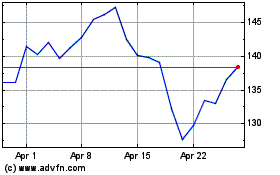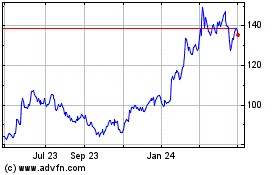Globalfoundries Launches Legal Battle Against Taiwan Semiconductor -- Update
August 26 2019 - 7:25PM
Dow Jones News
By Asa Fitch
Chip maker Globalfoundries Inc. has launched a legal attack on
several fronts against larger rival Taiwan Semiconductor
Manufacturing Co., including a request that the U.S. government
impose an import ban that could hit items such as iPhones, Lenovo
laptops and other electronic devices.
Globalfoundries alleged in 25 complaints filed across courts in
Germany, Texas and Delaware -- and before the U.S. International
Trade Commission -- that TSMC violated more than a dozen patents
covering chips and methods for making them, the U.S. company said
on Monday.
The ITC is an independent, quasi-judicial body that can block
importing of foreign products that are found to infringe on U.S.
patents.
"For years, while we have been devoting billions of dollars to
domestic research and development, TSMC has been unlawfully reaping
the benefits of our investments," Globalfoundries Senior Vice
President Gregg Bartlett said in a statement. He added the suit
also sought to protect the American and European manufacturing base
for all companies.
TSMC didn't respond to a request for comment. Apple Inc.
declined to comment, and Lenovo Group Ltd. didn't respond to a
request for comment.
Globalfoundries' legal broadside comes as the Trump
administration has pressed companies to increase U.S. production
and relocate jobs that had been shifted overseas back to America.
An ITC-import ban could have a significant impact on TSMC and
customers like Apple and Lenovo that do a lot of their
manufacturing abroad.
Globalfoundries -- which is based in Santa Clara, Calif., but
owned by Mubadala Investment Co., an investment arm of the Abu
Dhabi government -- said it has invested $15 billion in the U.S. in
the last decade and more than $6 billion in Europe. "These lawsuits
are aimed at protecting those investments," Mr. Bartlett said.
Despite the spending, Globalfoundries has fallen behind big chip
companies that make their products on contract for others. TSMC and
Samsung Electronics Co. have won market share by introducing
ever-smaller transistors that allowed their chips to power faster
and smaller computers. It costs billions of dollars to build
factories for smaller chips. TSMC has more than $10 billion in
annual capital spending.
Globalfoundries has shifted focus in recent years to less
cutting-edge chips that were cheaper to make but still profitable.
TSMC had a market share of 48.1% for contract chip makers in the
first quarter of this year, versus 19.1% for Samsung and 8.4% for
Globalfoundries, according to TrendForce, a Taiwanese
market-intelligence firm.
Patrick Moorhead, the president of analysis and advisory firm
Moor Insights & Strategy, said Globalfoundries was probably
targeting device makers like Apple because they won't likely be its
customers -- they need chips that are faster than the ones
Globalfoundries makes.
"You can bet Globalfoundries was trying to collect royalties
behind the scenes, failed, and will now let the courts decide," he
said. "The end [manufacturers] aren't the main target, but targeted
to put pressure on TSMC."
A Globalfoundries spokeswoman disputed that the company was
trying to collect royalties, saying the suits instead aimed to
protect investments and inventions. "We are no longer willing to
stand by while TSMC unlawfully violates our patented technology,"
she said.
The ITC typically decides within about a month after a complaint
is filed whether an investigation is merited. It tries to issue a
final verdict within 15 months. The ITC couldn't immediately be
reached for comment.
Write to Asa Fitch at asa.fitch@wsj.com
(END) Dow Jones Newswires
August 26, 2019 19:10 ET (23:10 GMT)
Copyright (c) 2019 Dow Jones & Company, Inc.
Taiwan Semiconductor Man... (NYSE:TSM)
Historical Stock Chart
From Mar 2024 to Apr 2024

Taiwan Semiconductor Man... (NYSE:TSM)
Historical Stock Chart
From Apr 2023 to Apr 2024
